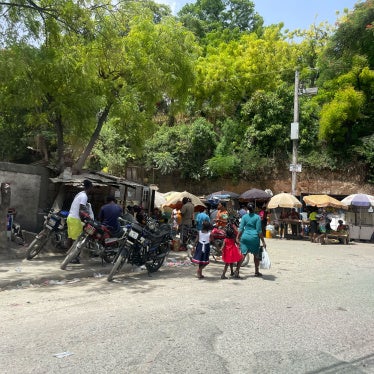(Washington, DC) – The ruling by Brazil’s highest court on April 12, 2012, expanding exceptions from criminal penalties for abortion is a positive step toward protecting women’s human rights, Human Rights Watch said today.
Abortion is a crime in Brazil, except to save the life of the woman or when pregnancy is the result of a rape. The Supreme Court ruling means that abortion in cases of anencephaly, in which the fetus has a fatal congenital brain disorder, is now also exempt from criminal penalties, and ensures that women can opt to terminate a pregnancy under such circumstances without lengthy judicial review.
“Anencephaly is made only more tragic when a woman has no legal option to choose whether to carry to full term a fetus she knows cannot survive,” said Amanda M. Klasing, women’s rights researcher at Human Rights Watch. “A woman who makes the difficult choice to terminate an anencephalic pregnancy should never be considered a criminal, as the Supreme Court’s landmark ruling recognizes.”
Anencephaly, often diagnosed when the fetus is in utero, is a neural tube defect in which a major portion of the brain, skull, and scalp fail to develop. An infant born with this disorder lacks a cerebrum, and will usually be born blind, deaf, and unconscious. If an anencephalic infant is not stillborn, the baby will often die within hours or days. In a rare case, the infant may survive longer, as in the well-known case in Brazil of Marcela Ferreira, who lived for 20 months. But infants with anencephaly do not gain consciousness and cannot survive infancy.
The psychological and physical effects of carrying an anencephalic pregnancy can be very damaging to women. Being forced to continue an anencephalic pregnancy can contribute to depression, anxiety, and other mental health disorders, and is associated with physical health risks such as hypertensive disorders, premature membrane rupture, and amniotic embolisms.
The United Nations Human Rights Committee has found that restrictions on access to safe and legal abortion may give rise to situations that constitute cruel, inhuman, or degrading treatment, including when a woman is forced to carry an unviable pregnancy to term. In 2005, the Human Rights Committee found that Brazil’s neighbor, Peru, was in violation of its obligations under the International Covenant on Civil and Political Rights when it denied a therapeutic abortion to a 17-year-old girl pregnant with an anencephalic fetus, forcing her to carry the pregnancy to term. The infant survived four days.
Ten of the eleven Supreme Court justices took part in the Brazil judgment, eight of whom favored allowing abortion or induced labor in cases of anencephaly. The majority reasoned that criminalizing the abortion of anencephalic fetuses is contrary to constitutionally protected rights of women in Brazil. Justice Marco AurélioMello, the key judge assigned to the case, reasoned that the rights of a fetus with no possibility of long-term survival could not prevail over the woman’s constitutional rights to dignity, autonomy, privacy, and physical, psychological, and moral integrity.
The court’s ruling follows eight years of arguments and deliberations. The case was initiated by the National Trade Union of Health Workers with the technical and institutional support of the Institute of Bioethics, Human Rights, and Gender in 2004. Justice Aurélio issued a preliminary injunction ordering health providers and justice officials to allow abortions in these circumstances early in the proceedings, but the injunction was suspended later in 2004.
Since then, although some women have successfully obtained judicial authorization to terminate anencephalic pregnancies, they have faced a lengthy and uncertain legal battle to do so.
“After eight years of deliberation, the court ultimately ruled in favor of protecting women’s human rights,” Klasing said. “The next step will be to make sure that the ruling is carried out so that women can get the medical services they are entitled to.”








